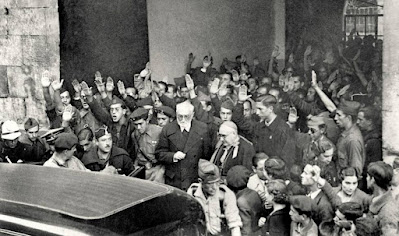It may just be me, but isn’t there something dodgy about flying a bunch of single women halfway around the world, to pair them off with a bunch of single men? It feels particularly rough if they’re going to live among people entirely unfamiliar to them, whose language they don’t speak, and where they’ll be cut off from their friends and family.
Doesn’t it feel all the dodgier to know that Catholic clergy were involved in making all those arrangements?
The women were the Marthas. Or possibly Martas. It all depends on whether you speak English, the language of the country they travelled to, Australia, or Spanish, the language of the country they came from, Spain.
It all began with ‘Operación Canguro’, an initiative in the 1950s backed by the Catholic Church in Australia, to bring in migrants from Spain. Back then, it claimed it had about 2 million followers in Australia, close to 20% of the population at the time. The Church wanted to increase its presence in the country. In absolute terms, it’s done well, since the number of Catholics is now over 5 million, but sadly, that still represents just under 20% of the total population, which has grown just as fast.
The desire to bring in Catholics dovetailed neatly with the needs of sugar producers to bring in skilled men to help with cane cutting.
That’s quite ironic, because sugarcane cutting was the main motivation for England to get into the transatlantic slave trade.
Much manual work in England’s North American colonies, which included the West Indies, was carried out by indentured labour. These were men who agreed to work for board and lodging only for a fixed period, say seven years, in return for having their transatlantic crossing paid for. At the end, they were freed from the indenture and might well acquire some land or set up in business on their own.
It wasn’t slavery, though it was hard work.
The West Indies were a great place to grow sugar cane. The traditional sweetener in Europe was honey. But sugar didn’t need bees and so it could be produced in far greater quantities.
Unfortunately, that involved cane cutting, desperately hard work under difficult conditions. Men from England or Ireland couldn’t cope. So the plantation owners came up with a brilliant idea: they’d import labour from Africa instead. Africans were used to the heat. And, what’s more, without white skins, they had no rights any white man had to recognise. They could be kept at their work without hope of freedom until they dropped, unlike the indentured labour.
That was slavery.
Australia didn’t go for slaves for their sugar plantations – there might have been nasty repercussions from pesky organisations like the United Nations. Nor did they use Africans: for a long time Australia explicitly banned non-white immigration.
Spain back then was under Franco’s dictatorship. That made it a bit of a pariah nation, the only Fascist regime to survive the Second World War, when Hitler’s Germany and Mussolini’s Italy had been defeated. Its isolation, and the sheer economic incompetence of its leadership, held it back from the kind of development that led to the post-war boom in Europe.
Emigration was one of the solutions for anyone looking to enjoy a little more freedom and live a little more comfortably.
Australia and Spain had no diplomatic relations. That gave the Catholic Church its opportunity. It negotiated informal agreements providing financial assistance for Spanish workers to emigrate to Australia, with the promise of assured work at better wages than they could earn at home. Every Australian worker has a car, they were told, which sounded like dazzling luxury to Spanish workers then.
Some 10,000 moved out. Getting on for 4000 were men emigrating for work, with many accompanied by dependants who made up the rest.
Things worked well in the sugar plantations, especially with the Basques who were found to be good at their work and conscientious. But sometimes white-collar workers managed to smuggle themselves into the programme, and there was nothing suitable for them, especially if they had no English. Besides, sometimes things fell through, so that even manual workers might find themselves waiting for months for jobs, living in resettlement centres, earning little money, eating unappetising food and wondering when they’d get out.
One of the big problems was the single men who joined the programme. They were lonely and isolated, with little or no English, and had little in the way of means to stay in touch with families 15,500 kilometres away.
Hence the Marthas. They were tempted out by promises of domestic work at good wages. And some were also tempted by the simple prospect of going somewhere else, away from the stifling atmosphere in Spain. Tempted even by the simple fact of air travel, normally way beyond their means.
What nobody told them was that the unspoken aim of their trip was for them to find the single young men and marry them. But that’s what many of them did – often to Catholics though not always to Spaniards.
The story of three of them is told in an article my good friend, and excellent source of blogpost material, Ana Cervera pointed me to.
They would all go to mass, and that was a great focal point where lots of the young people came together and got to know each other. Then they might move on to an evening out, where things could develop nicely.
Cristina, one of the women interviewed in the article, explained that she met her husband, John, at a dance, and he wouldn’t leave her alone afterwards. Her friends told the journalist that she only spoke ‘body language’ to him, a suggestion that got her smiling, sixty years on. But, she added, he did have a little Spanish.
Anyway, it turned out fine.
Leontina had been engaged before she came out to Australia. Her fiancé followed her and they were married in Australia.
Mari perhaps came closest to the desired behaviour pattern. She met a young Matteo at a Catholic social club shortly after arriving in Australia. Like Cristina’s John, he wouldn’t leave her alone (she claims) and eventually they married too. They had a life of hard work but a happy one, with four children.
All three women are still living in Australia. Cristina says that she’d do the trip again if she had her time over, though she certainly missed her family. As she missed Spanish bars. Even so, though she’s been back three times, she always returns to Australia, where she finds the life better.
Perhaps we shouldn’t be too hard on the Catholic Church. Things did work out, after all. Even though there were occasional bizarre moments, such as the day the Sydney Morning Herald published an article claiming that Spanish women had been seen working nude in a vineyard. The article was accompanied by a cartoon trying to be funny about the incident. The story led to a formal investigation which established that nothing of the kind had happened.
 |
From the Sydney Herald, March 1963
A weird, baseless and probably racist view of the Marthas
|
Even so, that kind of bad publicity, with its undertone of racism, helped create the atmosphere which brought the Martha programme to an end.As for Operation Kangaroo itself, some of the problems that had arisen in the later stages, such as jobs not being available as planned, led the Spanish government to pull the plug in 1963. The assisted emigration scheme was officially closed. Australian sugar producers would have to go looking for manpower elsewhere. And, of course, there’d be no more Martas.
Another reason for shutting down the initiative must have been what was happening in Europe itself. By 1963, when Canguro ended, 1436 Spaniards emigrated to Australia. That same year, 83,728 emigrated to other European nations. A lot closer, a lot cheaper, a lot more convenient.
Meanwhile, Australia has profoundly changed its attitude too. These days, not only are they not assisting emigrants to get there, now they’re actively keeping them out, and the camps they hold them in aren’t temporary resettlement centres, but something far uglier.
Fortunately, the Franco dictatorship is over. So today’s Martas don’t have to run away to Australia for a better life. They can have one right where they are.
Which, unlike Cristina, they can do without missing their families. Or Spanish bars.














